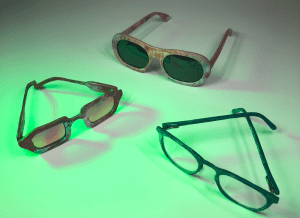Tunisian students turn bottle caps into trendy, eco-friendly eyewear
Inès and Sawsan have developed an innovative way to turn plastic trash into modern, eco-responsible eyewear accessible for all. With the support of Minassa Lab, a digital incubator for Tunisia’s cultural and creative scene, they are getting ready to launch their e-commerce in the next few months.

Like many kids from her generation, Inès Mesfar got used to collecting plastic bottle caps from a very young age. A common recycling practice in the 2000’s, this collection practice was advertised as an “easy way” to contribute to society’s environmental preservation.
“For me it became a habit: everywhere I’d go I would pick up those lids, from shampoo bottles to cleaning products or water bottles,” the 22-year old recalls, adding “but, to be honest, I didn’t really have any idea of what to do with them…”
Next to her, her fellow architecture student and business partner, Sawsan Jlezi agrees: “We were very keen on doing something good for the environment, which is a cause we’ve always cared about, but we were not sure of what or even how to get started.”
All they knew is that they wanted to get involved in the environmental field, and that it “had to be artistic”.

Minassa Lab: a unique opportunity
As they were heading to class one day, the two friends came across a poster advertising the incubator Minassa Lab, which described itself as “the digital laboratory of the cultural and creative scene”.
“This sounded perfect for us! So we got everything ready in a bit of a rush and submitted our application at the very last minute,” Inès remembers, noting that “at that stage, it really wasn’t much more than a vague, abstract idea.”
“Actually, I had lost my glasses one day, and I had no money to buy a new pair. Meanwhile, I had all those bottle caps at home which I was planning to use for an art project. Then, it struck me: why wouldn’t I combine the two to develop a project that could be supported by Minassa Lab!”
A few weeks later, the duo received the good news: they had been selected among 100 other projects, and could then start to take part in the EU-funded support programme.
According to its organisers, the Minassa Lab provides technical and financial support to students and young graduates from creative fields in the development of their digital creative business projects. Ultimately, the programme aims to accelerate the digitisation of the cultural and creative economy and to raise awareness of entrepreneurship among young people in creative sectors.
‘‘It was truly a unique opportunity, as they helped us through every step of the business creation process: from the ideation to the drafting of a business plan, even going through classes for public speaking building skills,” explains Sawsan.

An innovative, pollution-free creation process
But the first phase selection was far from being the last step of their journey: the two students now had to turn their idea into reality.
“We did a lot of research, and we found out that this type 2 plastic -the most common one you find in your daily life- had the potential to be heated without emitting any -or very little- toxic fumes and gases,” Inès explains.
“That was exactly what we wanted: we did not want to pollute our environment in order to recycle. We wanted to use a pollution-free creative process,” she continues.
Through a number of filters, mathematical calculations and mentoring, Inès and Sawsan managed to develop a specific formula to heat the plastic to the point of malleability “without it burning so much that it would emit toxic gases”.
They then had to formulate their findings into a business plan, conduct market research and prospect for future partners. “We are only creating the glass frames, not the actual eyewear, so we needed to find reliable, professional partners to commercialise our product. And this field can be very competitive!” the two friends recount.
Over the past six months, they have gone through a number of training, bootcamps and networking sessions with Minassa Lab, which brought them to the final stages of their business plan.
The two girls are now ready to launch Ayyure (or “moon” in Amazigh) as an e-commerce platform that offers accessible, eco-friendly eyewear, while promoting plastic recycling among the Tunisian people.

Innov’i- EU4Innovation contributes to the sustainable and inclusive economic development of Tunisia by strengthening, structuring and perpetuating the innovation and entrepreneurship ecosystem in Tunisia. Co-funded by the European Union and implemented by Expertise France, the project is worth 14.5 million Euros for a period of 60 months (2019-2024). It covers 21 of the 24 governorates of Tunisia.

The “Minassa Lab” project, implemented by Inco Tunisia and supported by Innov’i for a period of 18 months, aims at supporting the emergence of new innovative digital startups evolving in the sector of cultural and creative industries across Tunisia.
It seeks to provide technical and financial support to students and young graduates from creative fields in the development of their digital creative business projects. The project is centered around three specific objectives, namely to raise awareness of students and graduates to the challenges of creative and cultural entrepreneurship; to support 100 students and/or young graduates in the development of their creative and cultural enterprise project based on digital technology; to finance and support 15 startups.




























 Syria
Syria 


